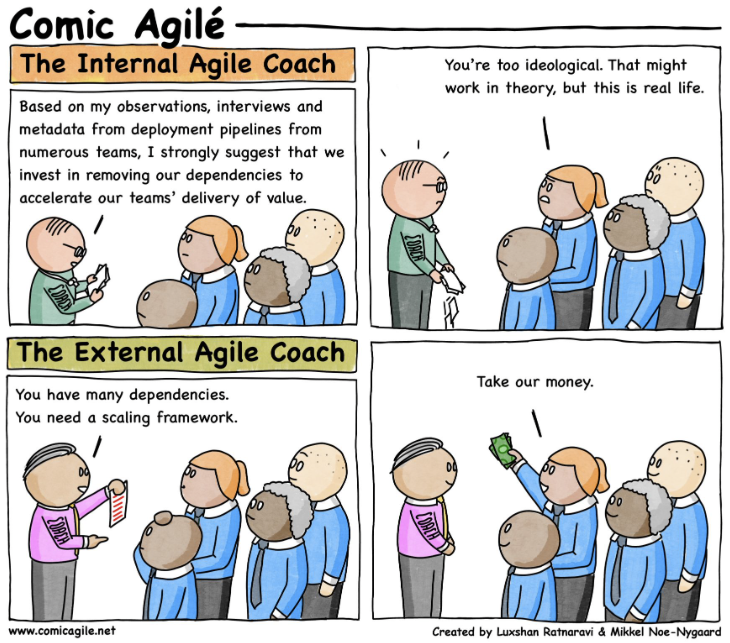A big bang often sounds like a great plan to make a change. The question is: isn't that too radical and don't we need a slower approach that's been well considered? In this blogpost, we explain why Big bang Agile Transformation might be a pitfall, and how to avoid it.
The big bang Agile Transformation approach and its problems
The decision to stop the way you’re currently working and make a radical mindset shift isn’t taken lightly. An underlying reason is often the threat of being outplayed by a competitor that’s able to shift faster than the others.
What it is
So, this 'big bang' Agile transformation is forced upon the organization, sometimes even without wanting it. The first reflex is to bite the bullet and to keep the transformation as short as possible. A management consultancy firm is hired, together with an army of consultants that will fill the empty slots.
The largest part of the investment is budgeted for the first 12 months. Afterwards, the consultants are thanked for their services and the company relies back on its employees to fill these roles as if they are already experts at their new jobs.

Why it might be a pitfall
The problem with this approach is that a transformation on this scale has a huge impact on the way of thinking in an organization. It’s impossible to have all employees find their way in this new way of thinking that is often quite the opposite of what they were used to.
They get frustrated by the problems this fast and aggressive Agile transformation brings them. They don’t recognize the company they used to love working for anymore. And they will sometimes even resist and fight this new way of working.

The alternative
An alternative approach would be to have one or a few teams experimenting with new ways of working. It’s good to agree on a timebox beforehand (often about 12 months). Those teams are guided by experts and together they repeatedly evaluate how things are going. They collaborate with the higher management to look at the feedback and adapt their strategy when necessary.
Those findings can then be used to allow other teams to gradually start their journey on a new way of working. The experts that guided the first teams can join these new teams and help them in their transformation. Another great opportunity is to talk to the 'early adopters' to learn from their successes and failures.
This way of working allows for a more personalized guidance per team that will make your employees feel more guided in the complexity a transformation brings. They will feel less chaos, have less stress and will probably be happier as well.
What to conclude on Big Bang Agile Transformation
The decision to embark on an Agile transformation journey isn’t taken overnight. It’s a complex process that will probably take multiple years and won’t provide out-of-the-box successes.
It’s an ongoing process that needs permanent evaluation and must be altered accordingly if you want to keep ahead of your competitors. So don’t start your transformation with a fixed end date in mind because it is impossible to know beforehand, due to the complexity it will bring.
Hire a few experts that will guide you through your transformation. After a while, you will notice that your employees will grow their skills. That allows you to cut the number of consultants and steadily reduce the cost of the transformation budget.
More on Agile Transformation? Check out our insights!